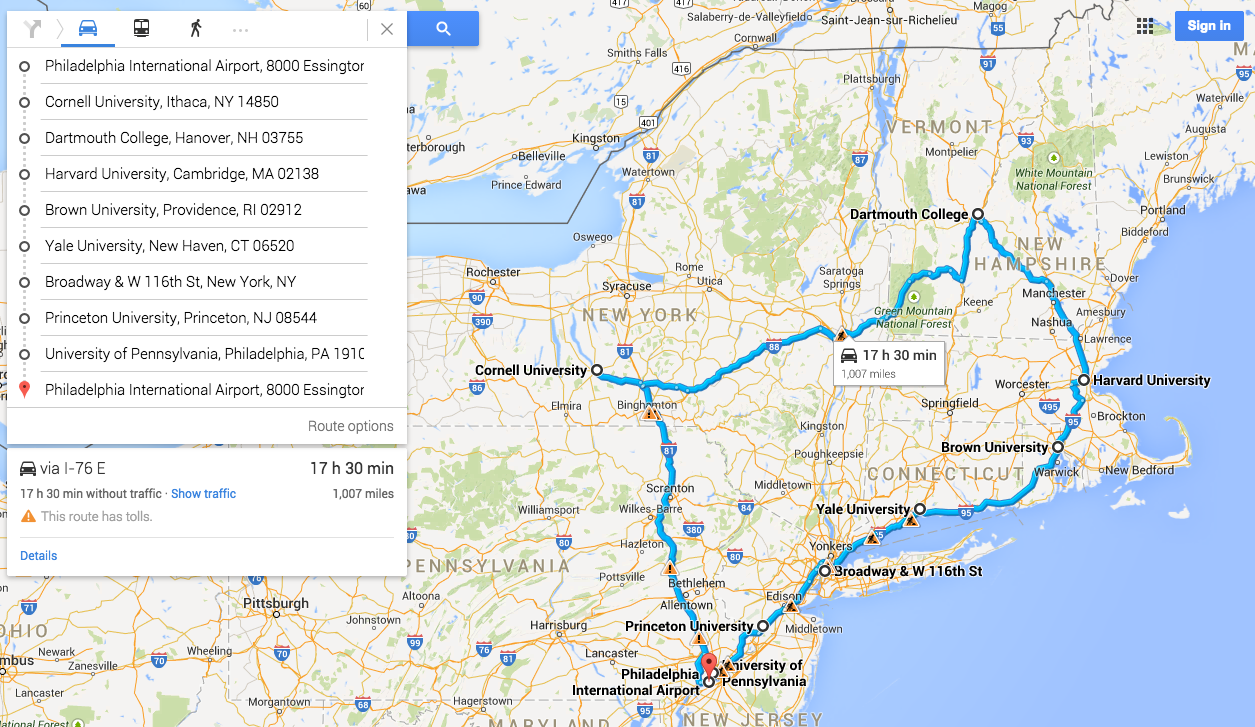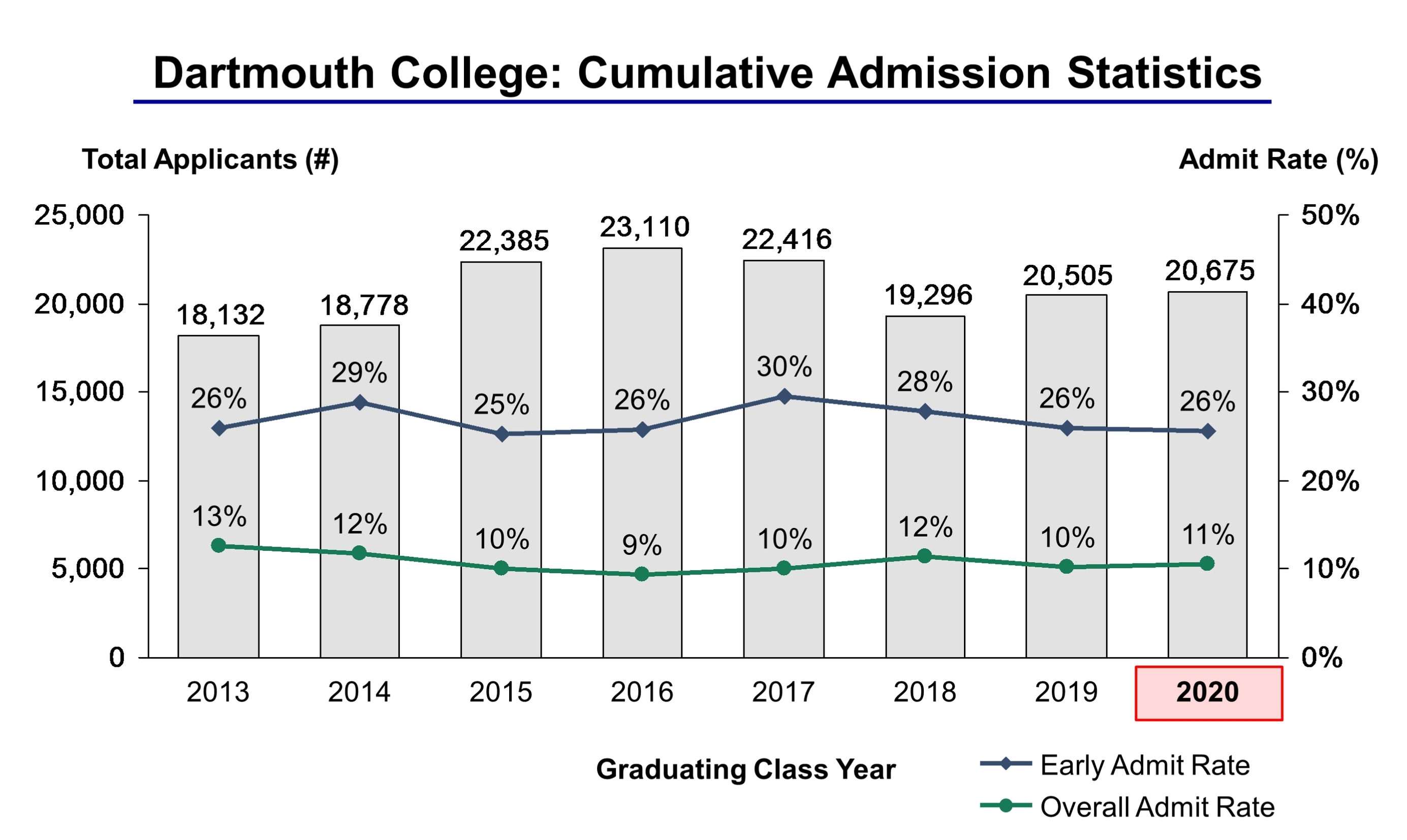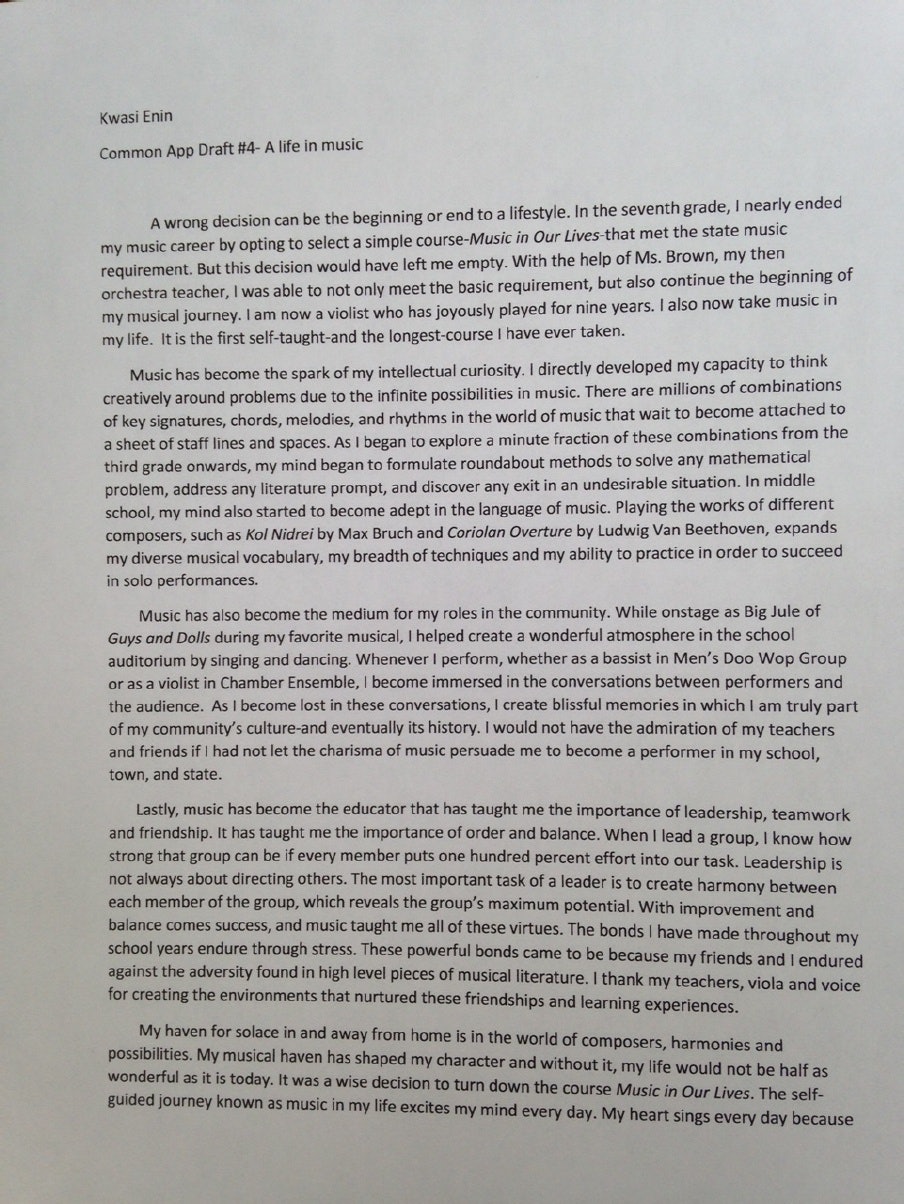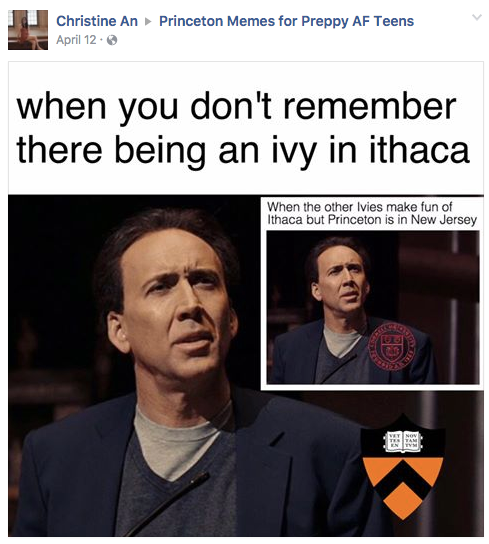Penn students develop the intellectual connections they need to thrive in an ever-changing and complex world. Working with faculty across a flexible curriculum spanning 4 undergraduate and 12 graduate schools, students develop adaptable, well-rounded minds. The physical proximity of the university's resources make thinking and learning between departments and disciplines a part of everyday life at Penn.
From innovative dual degree programs that defy traditional academic boundaries to rigorous grounding in the liberal arts and sciences, Penn is fueled by an open and endless exchange of ideas. Each Ivy League college has its own unique accomplishments that make it important. All carry a certain reputation with them, and each school has programs that excel primarily in the medical and law fields, making them some of the most sought-after schools in the world. Their admissions process is very selective, which helps the schools ensure that they only accept the best and brightest.
Many famous people have graduated from Ivy League schools, including recent presidents George W. Bush, Bill Clinton, and Barack Obama. This prestige leads many to believe that these colleges are only for the wealthy and elite. Often, companies look for Ivy League graduates as potential employees, usually preferred by law firms, medical facilities, and large corporations.
It has long been coveted to have earned a degree from an Ivy League school. Today, there are other competitors that some claim to be just as good as their Ivy counterparts. Some of these well-known schools include Duke University, Johns Hopkins, MIT, Vanderbilt, and Georgetown University, to name a few. The Ivy League schools are still excellent in both academia and in sports, and they have left a legacy of higher education with an exceptional track record and reputation to go along with them. The institution was founded in 1746, making it the fourth oldest university in the United States.
It is a medium-sized institution with around 5,000 undergraduate enrollments, and like Harvard, has an extremely competitive acceptance rate of only 5%. Some of its most popular degrees include computer engineering, public policy analysis, and economics. It is rated #2 of the best colleges in America to study political science and public policy analysis. SAT grades range from 1440 to 1570 and ACT grades range between 32 and 35. Test scoresDepending on the particular discipline an individual plans to study or the department they hope to join, Ivy League grad programs require applicants to take at least one of several advanced study standardized tests. In addition to the most commonly required GRE, students may need to take the GMAT, LSAT, or MCAT if they plan to study business, law, or medicine, respectively.
Some schools do not specify score requirements, but applicants can review average scores from past admissions to get a sense of expectations. Depending on the competitiveness of the program, some schools may also want to review ACT or SAT scores that were taken for undergraduate education. If you have the grades, test scores and other admissions requirements to get accepted into Ivy League schools to earn your math or science degree, you will want to apply to the best. News and World Report" is a leading expert in ranking schools and degree programs. They take in a variety of factors that include quality of classes and teachers, graduation percentages, student satisfaction and tuition cost. By learning what the best Ivy League schools are for math and science, you can get a better perspective.
Founded in 1701, Yale University is home to not only the top-ranked law school but the highly regarded Yale School of Drama as well. Other unique programs offered at Yale include the Betty and Whitney MacMillan Center for International and Area Studies where students are educated on international affairs, cultures, and societies around the world. Yale also offers 12 professional schools including schools of law, medicine, management, art, and nursing.
Yale was also the first institution in the country to award doctoral degrees to students. Ivy League schools happen to be ranked among the best institutions for higher learning in the world for various reasons unique to each university. Though most think what determines an Ivy League is its prestige, it actually began as the athletic conference the schools belonged to.
Each institution has rigorous admissions and an excellent graduation rate, and each one would be an excellent choice. However, we always recommend researching which school and its programs best fit with your individual education plan before applying. If there's one university in the country that needs little or no introduction, it's Harvard University. Widely regarded as the most prestigious Ivy League school, the Cambridge, Massachusetts-based Harvard was founded in 1636.
The school sprawls across a campus of around 210 acres, which is mostly centered around Harvard Yard. Presidents, 150 Nobel laureates, 62 living billionaires and current U.S. Harvard is made up of 11 academic units that offer 46 undergraduate majors, 134 graduate degree programs and 32 professional degree programs. As late as the 1960s many of the Ivy League universities' undergraduate programs remained open only to men, with Cornell the only one to have been coeducational from its founding and Columbia being the last to become coeducational. Before they became coeducational, many of the Ivy schools maintained extensive social ties with nearby Seven Sisters women's colleges, including weekend visits, dances and parties inviting Ivy and Seven Sisters students to mingle.
This was the case not only at Barnard College and Radcliffe College, which are adjacent to Columbia and Harvard, but at more distant institutions as well. The movie Animal House includes a satiric version of the formerly common visits by Dartmouth men to Massachusetts to meet Smith and Mount Holyoke women, a drive of more than two hours. As noted by Irene Harwarth, Mindi Maline, and Elizabeth DeBra, "The 'Seven Sisters' was the name given to Barnard, Smith, Mount Holyoke, Vassar, Bryn Mawr, Wellesley, and Radcliffe, because of their parallel to the Ivy League men's colleges." Ivy League schools offer a unique opportunity to learn from some of the brightest minds in the world in an academic setting, so students should try to take advantage of that at much as possible. TranscriptsIn order to verify whether an applicant earned the grades required for admissions consideration, Ivy League graduate programs require transcripts from all colleges or universities applicants attended.
Some may also require high school transcripts if admission is highly competitive. At Yale University, for instance, prospective degree seekers can upload unofficial transcripts during the application process but must provide official transcripts if they receive a letter of admittance. While they have similar demands for academic excellence and extracurricular achievement, the number of students who apply to them is smaller, meaning that each qualified student has a greater chance of acceptance.
At the undergraduate level, the school offers joint degree programs that allow college students to earn a business or management degree plus a second degree in either nursing, engineering, or liberal arts disciplines. These colleges are known for being selective in their admissions; since the year 2000, the acceptance rates at each of the universities is said to have varied from 6 to 16 percent. In fact, in the most recent academic year, seven of the eight Ivy League schools reported record-high applications; seven also reported record-low acceptance rates. 10 faculties are offering undergraduate and graduate-level programs in fields differing from professional fields like law, medicine, and business to degrees in liberal arts and social studies.
Being a private university, it is more costly than many well-ranked public universities in the United States. As the only Ivy League founded in part by Benjamin Franklin, University of Pennsylvania was founded in 1740. Another distinguishing item that sets U Penn apart from the other Ivy Leagues is that it has the highest international student enrollment with students hailing from more than 100 countries. There is a mix of liberal arts curriculum as well as professional education from students to choose from. The top-ranked schools include the Wharton Schools, the School of Engineering and Applied Science, and the Perelman School of Medicine.
The professional graduate schools include the Weitzman School of Design and the School of Dental Medicine. All these programs have engaging state of the art facilities and laboratories in which students learn alongside renowned faculty members. Some of the world's most prestigious institutions for higher learning are on the list of the U.S. list of Ivy League schools. These private institutions are known for their highly selective admissions process, rigorous academic programs, and their habit of graduating future leaders.
Ivy League schools have a reputation for being elite institutions, with high selectivity during the admissions process. Harvard University is currently the most selective university in the country. Out of 57,435 applications received for the Class of 2025, Harvard admitted only 3.4 percent of applicants. While the admissions process is extremely selective, it is not impossible for first-generation students to earn a spot in these world-class schools. For example, 16 percent of Yale's Class of 2025 are the first member of their family to attend university. However, the Ivy Leagues have recently come under fire for their admissions processes, which critics say favors legacy students to the detriment of minority students.
Undergraduates at Columbia University start with a common foundation of curriculum that includes literature, philosophy, science, art, history and music, and caps classes. Each class is only 22 students, so students experience close interaction with faculty. STEM programs like engineering and computer science are popular at Columbia.
Located near Manhattan, New York, much of Columbia's student body is passionate about political involvement, actively taking part in political engagements throughout the city. Considered "the quintessential great urban university," Columbia is also one of the most diverse Ivy League schools, boasting students from all 50 states and over 100 foreign countries. The process of applying to US universities is not only complex, but also highly competitive, with acceptance rates to top universities like Harvard, now under 4%. Crimson's unique approach lifts students above the global applicant pool addressing every aspect of the application with equal intensity. Book a free consultation to learn how Crimson can help you get into your dream Ivy League.
All eight are in the top 20 for number of sports offered for both men and women among Division I schools. Unlike most Division I athletic conferences, the Ivy League prohibits the granting of athletic scholarships; all scholarships awarded are need-based . In addition, the Ivies have a rigid policy against redshirting, even for medical reasons; an athlete loses a year of eligibility for every year enrolled at an Ivy institution. Additionally, the Ivies prohibit graduate students from participating in intercollegiate athletics, even if they have remaining athletic eligibility. The only exception to the ban on graduate students is that seniors graduating in 2021 are being allowed to play at their current institutions as graduate students in 2021–22. This was a one-time-only response to the Ivies shutting down most intercollegiate athletics in 2020–21 due to COVID-19.
Ivy League teams' non-league games are often against the members of the Patriot League, which have similar academic standards and athletic scholarship policies . The Ivy League is an American collegiate athletic conference comprising eight private research universities in the Northeastern United States. The term Ivy League is typically used beyond the sports context to refer to the eight schools as a group of elite colleges with connotations of academic excellence, selectivity in admissions, and social elitism. Its members are Brown University, Columbia University, Cornell University, Dartmouth College, Harvard University, the University of Pennsylvania, Princeton University, and Yale University.
While all Ivy League students possess the drive, stamina, intelligence, and passion to secure a spot at the school, that doesn't mean everyone is cut throat. If you want to re-apply to one of these eight schools, you'll need to update your application to show how you've grown and/or accomplished impressive feats in the interim. And while these schools continually rank at the top, there are other colleges and universities that are also highly selective, but do not officially hold the title of Ivy League.
Penn offers a uniquely cross-disciplinary approach to law, as all of its law programs are fully integrated with Penn's professional and graduate schools. In addition to the interdisciplinary coursework options, students may count up to four classes outside of the law school towards their law degree. In partnership with Penn Engineering, Penn Law offers a Law & Technology Program dedicated to preparing students for careers that combine law and technology.
To this day, Wharton offers the most extensive list of joint MBA programs. Harvard is best known for their highly ranked law school, but they also offer a variety of other academic units including medical school, design school, and business school. Between its rich history, highly esteemed academic programs, and beautiful tree-lined campus, Harvard is an excellent choice to receive your higher education at. They take the time to get to know applicants and select those who they think will take advantage of Columbia's community and offer a meaningful contribution to the community. The next thing you might want to know is how to apply for ivy league colleges?
Since Ivy League Institutions are some of the top-ranked universities in the world, the application and admission process is highly competitive. The college is known for its inter-college athletics and Native American presence. It offers majors in the arts, humanities, social sciences and engineering.
The highly ranked Tuck School of Business, Thayer School of Engineering and Geisel School of Medicine are some of the well-known schools of this University. Is one of the oldest in the list of ivy league colleges in the United States. With a total student strength of over 12,000, it is known for its drama and music programs. In your search for quality education institutions in the US, the name Ivy League is bound to come up. The elite group of educational institutions has been a constant source of fascination and aspiration amongst students who wish to pursue higher studies in the United States. But what is Ivy league exactly, who all are included in the list of ivy league colleges?
Interest in this answer stems from the Ivy League being synonymous with America's most selective, prestigious, and elite colleges. In other words, not only are Ivy League acceptance rates among the country's lowest, each school carries a strong brand name that follows its alumni throughout their educations, careers, and networks. InterviewWhile it's becoming less common for applicants to visit campus and interview with members of the admissions panel, schools are increasingly utilizing alumni living in the prospective student's region to conduct interviews. These face-to-face interactions offer students the chance to demonstrate other qualities about themselves that are not easily conveyed in an application or personal statement, such as confidence, charisma, diplomacy, and character.
While some may decide to emphasize points made on their applications, others use interviews as an opportunity to introduce other facets of themselves. With over 21,000 students admitted, the University of Pennsylvania has been one of the most sought-after institutes since its commencement. It has 11 schools offering a wide range of graduate and undergraduate programs from all streams like law, business, medicine, arts, and sciences.
The youngest Ivy League school, Cornell University, was founded in 1865 by Ezra Cornell and Andrew Dickson White. With the mission of instructing any student on any subject of study, Cornell offers an opportunity for students to produce creative work while promoting inquiry across a broad spectrum. The undergraduate colleges of Cornell admit their students and provide their faculty.
The largest undergraduate colleges are the College of Arts and Sciences and the College of Agriculture and Life Sciences. Though Cornell is known for all of its graduate schools, perhaps the most well-known is its top-ranked college Cornell SC Johnson College of Business and Weill Cornel Medical College. Other top-ranked graduate colleges are the School of Veterinary Medicine and Hotel Administration. It's likely no surprise that Ivy League-level colleges and universities would borrow a little "ivy" to use in their own names. These similarly prestigious groups of institutions include public schools, small liberal arts colleges, and other lesser-known, top-tier schools.
Coming up number one on this list is the highly prestigious Yale University. Chances are good that if you have been a serious student throughout your life, then you have at least daydreamed about the possibility of one day attending this incredible school. While Yale University is known to offer some of the most competitive and prestigious degrees in the sciences, the school is also known to offer one of the best English and literature programs in the world. Students are housed in residential colleges, each with their own head and dean who live and eat with the students. This structure creates a unique social system at Yale and a sense of community.



























No comments:
Post a Comment
Note: Only a member of this blog may post a comment.